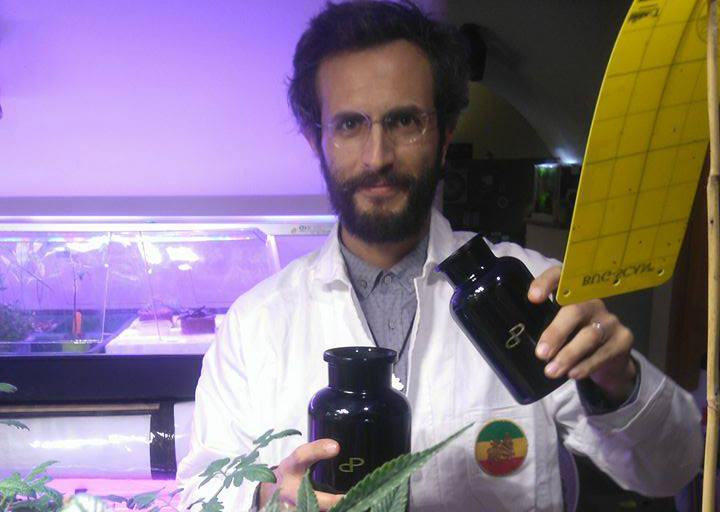Haïle Selassé Tefari is the founder of France-based Hemp Service International (HSI), a wholesaler and retailer of cannaromatherapy. He formerly worked as a trade analyst at Newedge Financial, a Futures Commission Merchant with operations on the New York Mercantile Exchange. He is also general secretary of the Association of Ethiopian Unity.
HempToday: Cannaromatherapy is a relatively new development, not widely known or understood. What is it, and what are the benefits that cannaromatherapeutic products bring?
Haïle Selassé Tefari: Cannaromatherapy is a combination of cannabis and aromatherapy – the science of essential oils. It’s about making highly targeted solutions that gather the phytocannabinoids in hemp and its extracts and the terpenes more characteristic of hemp essential oils, as well as distilled essences from other plants. The main benefits are that the cannabinoids, such as CBD and THC, are known to cause suppression of cancerous cells while leaving healthy cells intact. The terpenes in essential oils improve assimilation of the cannabinoids by the organism.
HT: As a trade analyst in commodities, how do you see the market for hemp derivatives unfolding over the next five, 10, 15 years?
HST: No matter what derivatives we talk about, the possibilities hemp offers point to a situation where we’ll eventually have a number of regionalized trading hubs, with food derivatives (seed, oil, protein flour) and hemp-based food supplements accounting for the bulk of market share among the hemp sectors.
HT: There doesn’t seem to be a lot of transparency around CBD. What’s the key to to building trust with the consumer?
HST: The varying national legal frameworks for hemp products containing CBD, as well as the relatively high technical requirements for production and analysis, leave the market wanting for more clarity and standards. Education is the key. As more people comprehend the dynamics of hemp, the more we can learn about our own nature and our relationship with nature in general.
HT: The path from the New York Mercantile Exchange to the hemp business might seem unusual to some. Are you following a path between the two, or did you take another path when you branched out from the world of finance?
HST: During my years on the floor of the NYMEX, I used to cherish the moments when the ticker would display changing market prices for hemp derivatives instead of petroleum based products. After years as a trade analyst, I began to see the potential to create a sustainable investment fund, and that hemp had the potential to be the No. 1 diversification instrument for a profitable economic structure that respects the environment.
That’s when I decided to leave New York and the financial world and relocate to the countryside in southeastern France. Once there, and after many long hours of R&D focused combining ancient science and modern progress with hemp, I formed a consultancy to help producers with such things as cultivation, sowing, processing, product development and marketing of hemp products.
HT: While HSI operates globally, your head office is located in France. How do you see things unfolding in the French hemp industry going forward?
HST: If France is to remain a world leader in hemp production, French proponents will need to adjust and embrace other core applications. Why should most of the French hemp fiber now being produced go into the construction industry when the real estate market keeps contracting? The French hemp industry, to be successful, may therefore need to reorient itself toward such things as expanding sowing seed production, and to organic grains, office papers, biodegradable hemp plastic, fine textiles, biodegradable hemp plastic, and even hemp ethanol.
HT: Tell us a bit about your work with the Association of Ethiopian Unity.
HST: Ethiopian culture has been essential to humanity since Ethiopians left the Eden region in the horn of Africa with their language 50,000 years ago in order to populate and civilize the entire world. While the world will not know peace as long as Africa is at war, the solutions to Africa’s problems remain internal to Africa and Africans. Our objectives are to develop sustainable business models in more advantaged nations so those advantages can, in turn, be shared in places where they are needed the most – not only in Africa but throughout the world.
HT: How does your faith figure into the life’s work you have set out for yourself?
HST: Following the example of Jesus Christ in the name of His Majesty Haile Selassie I gives our generation great inspiration to reach its full potential. To that extent, our personal hemp-related projects are just humble industrial engines to realize a more efficient, pollution-free economy in harmony with the universe.
Beyond its miraculous intrinsic properties, hemp is also a precious catalyst for the social fabric. It’s a mystical yet powerful plant but also a double edged sword: It can backfire on those who approach it with vain intentions. As with all the vital precepts modern man seems to have forgotten, our primary duty remains to lead the way out of mental confusion and spiritual bondage.

